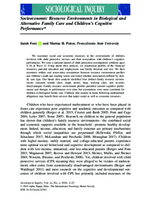Abstract
We examined social and economic resources in the environments of children involved with child protective services and their associations with children's cognitive performance. We used a national dataset of child protection investigations (children aged 6–16 at Wave 1). Using latent class analysis, we constructed profiles of the financial resources, parental education and employment, and family structure and size. We then examined within‐ and across‐time associations between resource environment profiles and children's math and reading scores and tested whether associations differed by family care type. Our latent class analysis identified four distinct family resource environments: educated middle class, single earner, large working class, and severely disadvantaged. Family resource environment profiles predicted current cognitive performance and changes in performance over time, but associations were more consistent for children in biological family care. Children who remain in home following maltreatment allegations may benefit from services that target social as well as economic resources.

